Welcome to a particularly special entry! It is with no small amount of pleasure that I announce that this here is the 100th, published entry of Counting Reflections, which has been running for about four years. Honestly, I am rather pleased with myself for having reached this number of entries, but hope that I will be able to reach 200 in less than four more years. Here's hoping!
Considering my fascination with identity and all of its nit-picky little aspects and incarnations, not to mention its dire complexity and strangely stubborn-yet-volatile nature, and given that I have discussed identities on here before, I thought that a nice idea would be to delve deeper into these topics and do a whole series of character analyses, devoting an entire entry to the character in question, putting them "under the microscope" to examine them as comprehensively as I can.
Considering my fascination with identity and all of its nit-picky little aspects and incarnations, not to mention its dire complexity and strangely stubborn-yet-volatile nature, and given that I have discussed identities on here before, I thought that a nice idea would be to delve deeper into these topics and do a whole series of character analyses, devoting an entire entry to the character in question, putting them "under the microscope" to examine them as comprehensively as I can.
Unlike the MBTI series, this series of entries will not have a clearly marked beginning and end, nor will I attempt to cover all characters from a given series. Instead, I shall pick the characters I most wish to write about, when I wish to write about them, though suggestions are always welcome!
Without further ado, let me introduce the first character to be discussed in what I shall call my "Beneath the Surface" series: Morrigan of Dragon Age: Origins.
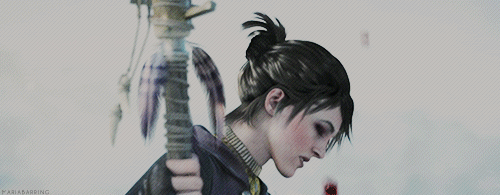 |
| Image posted by Maria Barring |
Daughter of the Wilds
Morrigan is a "Witch of the Wilds" an Apostate Mage living in the Korcari wilderness, on the very fringes of civilisation. She grew up far from other people, raised only by her mother, the insidious Flemeth, infamous witch of ancient legend, from whom she learnt the art of working magic, as well as the powers of the Shapeshifter, allowing her to wear the form of an animal. Her mother is a complicated character in her own right (so much so that another of these entries may focus upon her) and she has sought to instill Morrigan with a steadfast resilience against anything she may encounter, producing a tough daughter. Though they have fought off Templars in their time, Morrigan and her mother have evaded capture by the Knights of the Chantry, able to live as Apostates: those mages who live outside of the restrictive confines of the circle and its religious enforcers.
"The Chasind have tales of we witches... I have prowled shadows that you never dreamed existed. Am I an unnatural abomination, to be put to the torch?"
In spite of her reclusive upbringing (and perhaps in no small part due to it), Morrigan has wandered into civilisation before, though each time she has returned to her mother, having always faced some kind of deeply alienating experience or profound rejection from her brief interludes into the "civilised" world. Hence, she has remained by her mother's side...until the Warden came with their quest to save the nation from the Blight and she was instructed to take her leave and aid the Grey Wardens in the preservation of the realm and the downfall of the Darkspawn.
Such is her story, now to probe a little further...
A Mother's Love
"I raised her to be as she is! I cannot expect her to be less."
When first introduced to Flemeth and Morrigan, it is clear that, in spite of her obvious desire to assert her own capabilities and independence, Flemeth has kept Morrigan under her thumb and there is no question as to her authority over her. This is understandable, for the pair have lived alone together for the majority of Morrigan's life and such a hierarchy (and a level of dependency, fostered by custom) has had time to become firmly cemented. In spite of this, Morrigan is certainly not entirely kowtowed by her mother, she fights back, struggles and asserts herself, though Flemeth seems to take little notice of such outbursts, able to cripple her daughter's efforts with a few words of cutting mockery.
There does not exist any great warm between these two, that much is apparent on both occasions in which they are met together, though there is a certain degree of sentimental respect on Morrigan's side. When she bids goodbye to her mother, she does so in a very roundabout way, presenting "false" concern which masks a genuine desire not to have to leave. Of course, she very much desires to leave and see the world for herself, rather than to only hear of it through her mother's tales (which is possesses a keen interest in, if Flemeth is to be believed), but this desire can only be achieved by leaving behind the only world she has ever known: the Wilds and her Mother. True, her mother has never been a great source of emotional strength, but she has protected her and raised her, naturally there is a connection there. Morrigan is accustomed to the relative comfort and safety of her environment and is now having to leave it. In spite of her capability and outwardly displayed self-confidence, she is very much a child leaving home. She is vulnerable.
"Morrigan is innocent. She is beautiful. She is vulnerable." - Kate Mulgrew
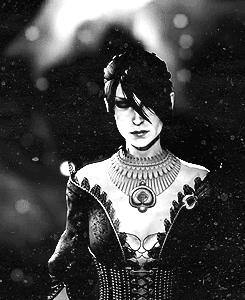 |
| Image posted by Everything Dragon Age |
Needless to say, Morrigan's relationship with her mother is a touchy subject and one which she covers up with humour, trying to appear as if she does not care when in truth she cares very deeply beneath the surface. When asked what she would do if her mother died, she responds with "Before or after I stop laughing?". She evades any such questions as to how she feels and the Warden can lose her respect if they attempt to engage in a sentimental discussion with her about her mother (or any kind of sentimental conversation, which Morrigan, though she does connect with sentiment, openly speaks against). That being said, she evidently respects her mother a great deal, for any attempt to argue against the lessons Flemeth has taught her (that independence is a virtue, that emotional connection is weakness and unnecessary, among other things) is met with open hostility. Though she fights against her mother, she very much respects her and acknowledges her authority and power in a complementary (as opposed to purely cold) manner.
Their relationship is darkened upon the discovery of Flemeth's Grimoire, which had somehow ended up in the Circle Tower. Upon reading it, Morrigan discovers that her mother's longevity has apparently arisen from a cyclical ritual in which she births and raises a daughter in order to take that daughter's body as her own when her previous body has aged beyond usefulness. It is thought that the stronger the daughter is with magic, the easier it is for Flemeth to take her over, thus giving her a motivation to send Morrigan with the Warden, otherwise Flemeth would have sought to protect her greatest asset.
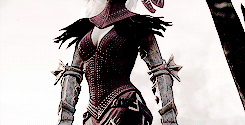 |
| Image posted by Ozoi |
This discovery is evidently shocking to Morrigan, who still cannot quite believe the level of "betrayal" within her mother's plot. Though, at the same time, she evidently knows her mother is capable of doing such a thing, for her immediate conclusion, seemingly without much need for consideration, is that the Warden must kill her mother, and she reaches this conclusion without professing any desire to speak with her or displaying anything beyond a basic sentimentality. She does care for her mother, but having discovered her intention to exploit her, Morrigan, who has taken Flemeth's lessons to heart, does exactly what her mother would have done in her place. Though Flemeth, through magic, ultimately survives, Morrigan proves herself as both very similar to Flemeth, but also fundamentally different - for she does open herself to her more emotional side, something which we have yet to see from Flemeth (though there are indications, with her discussions with Merrill in DA:II, that she suffers deep regrets. For what, we do not yet know).
Morrigan gains her clinical pragmatism and her mistrust of others from her mother and with it comes an inability to understand and correctly handle her own emotions. Though her mother has given her great magical talent and taught her to control it, she failed in giving her the emotional development from which she may have benefitted and, due to the isolation, there was no other source which could have provided her with such. However, compassion comes naturally to human beings and Morrigan evidently has a great deal of it, as well as the ability to empathise. Neither of these are expressed to any great degree, for Flemeth has tried to fashion her daughter into her own likeness. After all, if all goes to plan, Morrigan will one day be Flemeth.
"I'm not sure whether she's your daughter or your enemy."
"Neither is she."
| Image posted by The Heart Is A Home For Ghosts |
Civilisation and Isolation
Having been raised in such an isolated environment, Morrigan is profoundly alienated when it comes to dealing with other people, more so than almost any other character within the series (I would argue even more so than Sten, who may hail from a vastly different culture, but a culture nonetheless), though she is an exceptionally determined individual, so her lack of understanding of social situations is masked behind a veil of apathy. Morrigan has only ever learnt of people "in theory", rather than meeting them, talking with them, developing even basic social skills and thus she views all other people more as ideas and caricatures than as people. She does not care for many others and tells herself that she does not care for those for whom she does care because she has never learnt how to care for others appropriately.
"Ah, look how they moan and wail and gnash their teeth. 'Tis sad to watch how helplessly they scurry about."
We learn our culture and our place within it, and thus, a portion of ourselves, through exposure to it, through being inducted into it. Basically, we learn our culture through living it. Morrigan has never had this, for she has been raised outside of a culture. Flemeth kept her apart from other people and, upon discovering that Morrigan had been occasionally venturing into the "civilised" world, responded with anger enough to leave quite the impact on her daughter. Her mother's desire to hide comes from two motivations: the desire to keep their magic hidden (mainly to avoid hassle rather than danger, considering how powerful Flemeth is) and elitism. Flemeth, rightly or wrongly, considers herself to be better than most others (despite her attempts at presenting herself as humble) and this arrogance has washed off on Morrigan, who ultimately tries to see others are less intelligent than herself. This is again due to her underdeveloped emotional understanding, though she certainly is intelligent.
"I left the wilds more than once when I was young, to seek more of the world of men."
This having been said, Morrigan's responses to civilisation are birthed from a fear of that which is beyond her understanding and yet which inspires within her such a deep curiosity. Though somewhat paradoxical, this is certainly the case and this paradoxical nature is what causes so much strife within her. Flemeth herself says that her daughter wants to venture into the world and see it for itself, but that she has, until the arrival of the Warden, been unable to do so. Morrigan wants to understand other people, she has the capacity to and the desire to come to know them better, on an emotional level, but she is scared of doing so, as such an act requires trust and an open channel with one's emotions, neither of which she is open to experimenting with. Again, this is very much down to her mother, who never responded in such a way as to open up those channels. She is very much stranded in the wilderness, looking into civilisations with a child's curiosity, yet the cynicism of an old crone.
"I... have never seen such a collection of merchants and people before. 'Tis always so?"
Interestingly, Morrigan's solitude has led to her seek solace in animals, for her Shapeshifter abilities allow her to enter into their world wearing their shape. When asked about it, she reveals that she had occasionally felt the wilds call to her, that she would slip away from Flemeth and take the form of some animal creature, and pass hours with beastial companions. Yet this has not given her any great love for nature, nor has it transformed her into this enlightened "earth mother" character. She is almost as cynical of animals as she is of people, only less so towards them due to her acknowledgement that they cannot scheme and plot as people do. Though she has drawn strength from nature, she does not identify herself with it, thus preventing her from being fully identified with it, though she has certainly been shaped by it more than she herself might wish to believe.
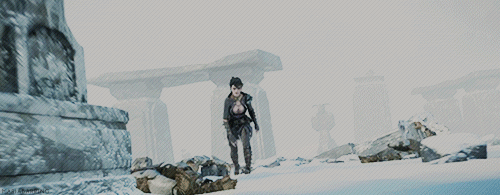 |
| Image posted by Maria Barring |
One could certainly argue that Morrigan's closeness to animals has highlighted to her how different she is from the beasts whose forms she can wear, a difference which she perhaps fails to see in many other people, thus leading her to be cynical about their "human nature" (or elven, dwarven, etc.). Perhaps it is the case that she views other peoples much like she views animals, though she has more respect for the animals who do not pretend to be something that they are not, whilst many people pretend to be better. She does seem to have a preoccupation with considering others to be lying to themselves, deluded or simply misguided.
“The world of man... is dangerous.”
“And frightening, I imagine. Especially for someone ill-prepared for it.”
Apostasy
In so fervently opposing the Chantry and its rulings, Morrigan comes to define herself in opposition to the structures she so hates. As for what she specifically hates about the Chantry, there are a few things to chose from, though I find it interesting to note that there is a degree of bravado present even in her attitudes towards the Chantry.
Before explaining further, perhaps I should briefly summarise what the Chantry is. Basically, it is the major religion of Thedas (literally "The Dragon Age Setting" The-D-A-S, Thedas, which is the world in which Dragon Age is set). They are heavily influenced by Christianity, their history revolving around Andraste, the messiah of their God, the Maker, who arrived to spread his word to the world and was betrayed and burnt at the stake. Most importantly, the Chantry have a very low opinion on magic in general, which stems from the words of their prophet. Essentially, they see it as a curse, as something which "exists to serve man and never rule over him". As with anything taken from a religious text, the scriptures have multiple meanings. Whether it is because they see them as evil, easily manipulated by demons or any other reason they can think of, the Chantry, at minimum, require Mages to be accounted for. This means that most of those who can use magic are forced to live in a Circle of Magi, which is meant to be a safe place for them to live and learn together. It is, in truth, as much a prison as anything else.
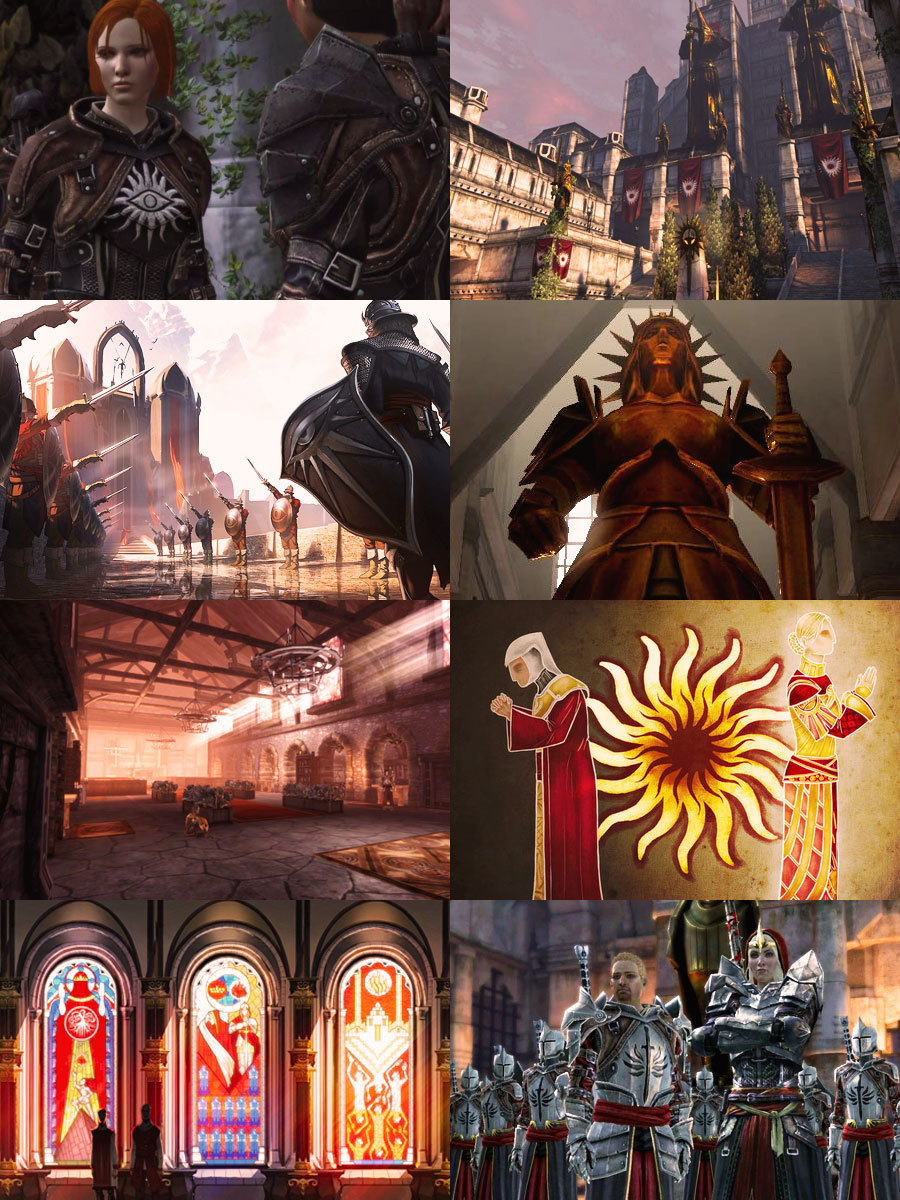 |
| Image posted by Hawkules |
In typical Morrigan style, she expresses no sympathy for the Circle Mages upon discovering that the veil has been torn and that Abominations (possessed mages) are running amok, with many magi having been slaughtered. This is a moment in which we can see, perhaps more vividly than elsewhere, the impact of Flemeth's teachings. Morrigan sees magic as something exceptionally important and miraculous, something that should be cultivated and explored and embraced. This is true. However, what she values more is independence, liberty and the individual asserting themselves over an authority which would attempt to constrict it. By willingly, in most cases, allowing themselves to be captured and live under the rule of the Circle, these mages have committed, in Morrigan's eyes an ultimate offence, surrendering of the self to some greater dogma, which she considers exists only to exert control.
"It would be a silly thing, prolonging your life. A waste."I believe that this is what Morrigan opposes most about the Chantry: their dogma. I know that many consider Morrigan to be atheist, though David Gaider's tweet (displayed below) suggests that this is not the case. I would consider it more likely that Morrigan is an agnostic or that she believes in some kind of deeply personal deity. She is certainly a free thinker, one who opposes limitations or anything which tries to box her thinking. This desire to constantly assert herself and subvert others is what gives us so much to talk about. She wants nothing more that to be herself, though she is not quite sure who that is yet, but she is quickly finding out. Restrictive hierarchies are her anathema and those that follow them are, to her, lost and weak. Though this attitude is shaped by Flemeth, I think it safe to say it is as much her own opinion than hers.
@Cimeas Neither Morrigan nor the Qun are atheist. If someone prefers to believe that's what their character is, more power to 'em.
— David Gaider (@davidgaider) July 10, 2012
Interestingly, Dragon Age: Inquisition will see her taking a place in a hierarchy as she becomes the Arcane Advisor to the Empress of Orlais. It will be interesting to see how this has changed her, for Morrigan has certainly seemed to have matured (from what little we have seen of her in the trailers and pre-release materials) though I have no doubt she remains fiercely independent, even if she is beginning to work in with the system to a degree. This is but speculation, for answers, we shall have to wait.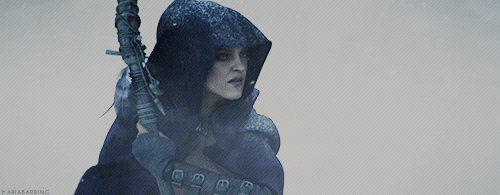 |
| Image posted by Maria Barring |
Getting Dialectical - Wynne
A trend I have noticed in both Dragon Age games (though to a lesser degree in the second), when it comes to companions, is that there appears to be two characters of each class, one of which serves to subvert the norms whereas the other seems to support them. In Dragon Age: Origins, we have Alistair, a fighter who supports tradition, mostly, and Sten, who is Qunari and thus would change the whole of Ferelden if he could. Likewise, Zevran is an outsider assassin whereas Leliana is a believer in the Chantry. Morrigan is the subversive mage, making her counterpart the mage who supports the circle and what it stands for: Wynne.
Wynne and Morrigan seem, at least on the surface to be completely opposed. The former is an established member of the Circle, who has devoted her life to it and to the task of protecting young mages, who fosters a philosophy of extreme selflessness and whose focus is in magics which restore and heal others. Morrigan hates the Circle, the Chantry, has only ever been devoted to herself (in fairness, she never really had anyone else) and whose magic is far more oriented towards the degradation of her opponents.
Again, we can define Morrigan through her opposition to Wynne.
“But the Circle is no place of safety. 'Tis a place of subjugation.”
“Is it? It is by no means perfect, I agree, but consider the alternative. At least other mages can understand our struggle. We can help each other.”
'There is no writing on my forehead that says "Please, guide me!"'
Morrigan opposes Wynne's position of authority. I think perhaps she considers her to be in some ways similar to Flemeth, and older woman of considerable magical ability (though nowhere near Flemeth) who seeks to promote her beliefs in others as a guide and a teacher. Morrigan has already suffered under the oppressive dogma of one mother and is in no rush to find another, though at the same time, Wynne has many motherly traits which likely force Morrigan to reflect on the role her own mother has played in her life. Undoubtedly, this is an uncomfortable topic, resulting in heightened hostility towards Wynne, only exacerbated by their oppositional views.
"I am not Alistair, who sees in you a surrogate mother."
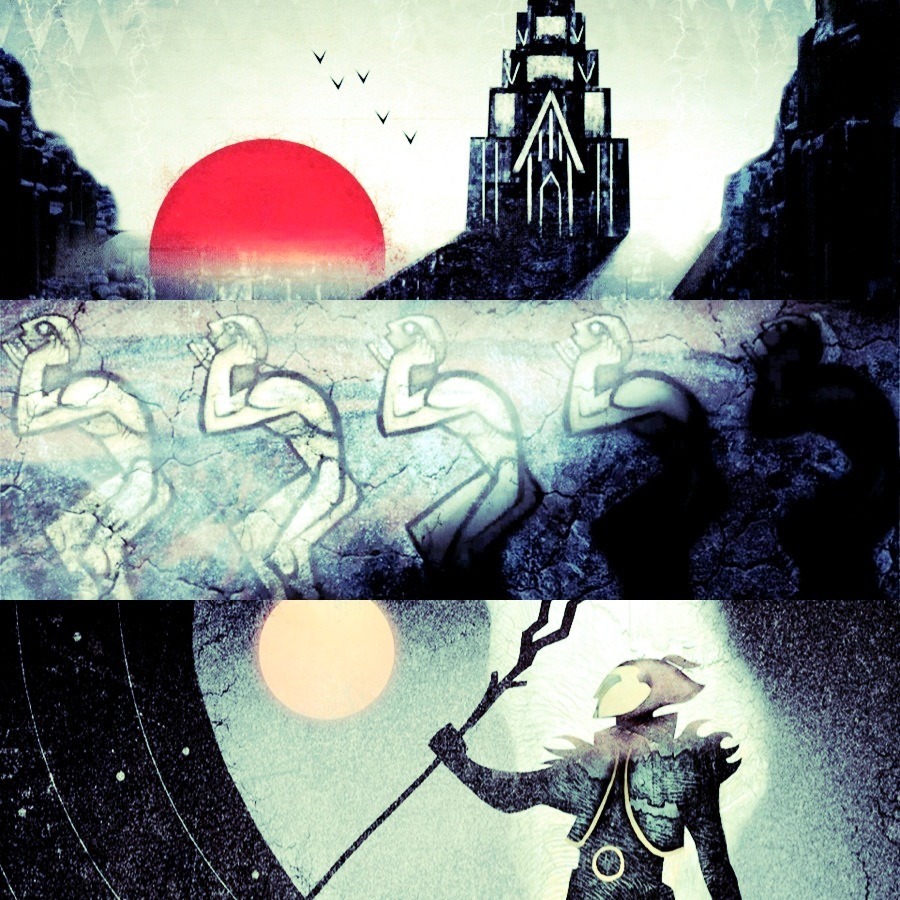 |
| Image posted by Warden Cortana Croft |
Her Namesake
There is power in a name, such a concept is one of the most ancient, featuring in stories, both fantastical and otherwise as far back as there have been stories. Whilst Dragon Age itself has not implemented any kind of magical power involving names, at least it has not done so to the best of my knowledge, Morrigan bears a particularly interesting name, one which hails from Irish mythology.
The Morrigan is one of these elusive figures which varies according to which source one is reading. She is widely referred to as both the "Phantom Queen" and the "Great Queen" and many sources depict her as a Goddess, one associated with Battle, Strife and Sovereignty. Some theorists consider her to be the Irish counterpart to the Norse Valkyries, female minor deities who would decide the fate of warriors in battle and collect the worthy dead for delivery to Valhalla. This connection is strengthened by the fact that the Morrigan was known for her ability to wear the shapes of many animals, and is associated with the crow, whereas the Valkyries were associated. Both small, black birds.
Morrigan of Dragon Age is, of course, a shapeshifter and, whilst the game rules limit her to being able to assume the forms of a spider, a bear or a swarm of flies, she professes to be able to assume the shape of whatever animal she has had the chance to observe for a sufficient amount of time. Thus the shape of a bird is perfectly possible. Additionally, one need only glance at her original robes to note the black feathers upon her pauldron (shoulder). Crow feathers, raven feathers, either are possible. Such references are present.
Additionally, the Morrigan is often considered to be a Triple Goddess, one aspect of a three-part being, which is at once one being and three. There are many examples of these deities throughout history (the Graeae, which were covered in a recent MBTI entry would also fit this category), most notably one could consider the God of Christianity to be a Triple Deity, as he exists as the trinity of the Father, the Son and the Holy Spirit. Furthermore, when it comes to the presentation of witches, three is consistently a number associated with them. A prime example of this would be the Witches three in MacBeth.
Interestingly, the other two deities which are part of her trio are considered to be her sisters, all three of which were born of a single mother. We know from Dragon Age: The Silent Grove, that Flemeth has another daughter, Yavana (who interestingly sees the ritual possession Flemeth is seeking to perform on Morrigan as a gift), and there is nothing to indicate that she does not have others. Thus, there are possible links in the story there.
Therefore, we can see how parts of Morrigan's character, though perhaps not her personality, stem from her Irish namesake. A shapechanger, part of something greater than herself, associated with crows and ravens, bastion of strife.
The Morrigan is one of these elusive figures which varies according to which source one is reading. She is widely referred to as both the "Phantom Queen" and the "Great Queen" and many sources depict her as a Goddess, one associated with Battle, Strife and Sovereignty. Some theorists consider her to be the Irish counterpart to the Norse Valkyries, female minor deities who would decide the fate of warriors in battle and collect the worthy dead for delivery to Valhalla. This connection is strengthened by the fact that the Morrigan was known for her ability to wear the shapes of many animals, and is associated with the crow, whereas the Valkyries were associated. Both small, black birds.
Morrigan of Dragon Age is, of course, a shapeshifter and, whilst the game rules limit her to being able to assume the forms of a spider, a bear or a swarm of flies, she professes to be able to assume the shape of whatever animal she has had the chance to observe for a sufficient amount of time. Thus the shape of a bird is perfectly possible. Additionally, one need only glance at her original robes to note the black feathers upon her pauldron (shoulder). Crow feathers, raven feathers, either are possible. Such references are present.
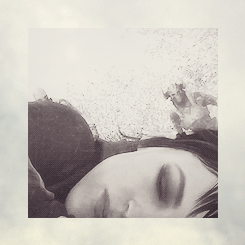 |
| Image posted by Lemmy Leyra |
Additionally, the Morrigan is often considered to be a Triple Goddess, one aspect of a three-part being, which is at once one being and three. There are many examples of these deities throughout history (the Graeae, which were covered in a recent MBTI entry would also fit this category), most notably one could consider the God of Christianity to be a Triple Deity, as he exists as the trinity of the Father, the Son and the Holy Spirit. Furthermore, when it comes to the presentation of witches, three is consistently a number associated with them. A prime example of this would be the Witches three in MacBeth.
Interestingly, the other two deities which are part of her trio are considered to be her sisters, all three of which were born of a single mother. We know from Dragon Age: The Silent Grove, that Flemeth has another daughter, Yavana (who interestingly sees the ritual possession Flemeth is seeking to perform on Morrigan as a gift), and there is nothing to indicate that she does not have others. Thus, there are possible links in the story there.
Therefore, we can see how parts of Morrigan's character, though perhaps not her personality, stem from her Irish namesake. A shapechanger, part of something greater than herself, associated with crows and ravens, bastion of strife.
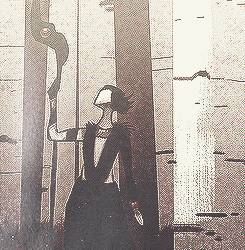 |
| Image posted by Dorian Xpavus |
Finally
Bearing in mind what I have written here, I would class Morrigan as an INTJ, though her secondary type would definitely be INFJ. In terms of Enneagram of personality type, I would place her either as Type 4 (The Artist / Individualist) or Type 8 (The Assertist / The Challenger). Her tarot card would be the Queen of Swords.
Certainly, it will be interesting to see how Morrigan's character will develop as she appears in Dragon Age; Inquisition, for, as mentioned, she seems to have matured a great deal. Who knows what Morrigan we will be presented with? I for one am sure that she will remain as sarcastic and fiercely independent as ever, though perhaps she will sacrifice some of her nature to aid in the winning of the war? I hope to find out!
So concludes the 100th entry. Thanks for reading!
No comments:
Post a Comment